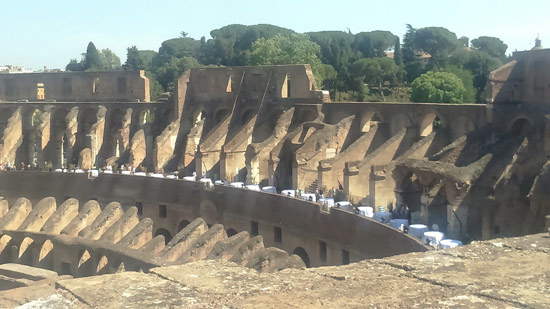When, exactly three years ago, Matteo Renzi, as mayor of Florence, closed Ponte Vecchio to allow a gathering of wealthy Ferraristi who had had the nice idea of dining on Florence’s best-known bridge, it was hoped that it was more unique than rare. No one, in short, hoped that the"closure of public property for private party" could become, in the future, a practice. Hopes in vain: with the passive acquiescence of a political class affected by a good dose of servility, and often with the explicit tolerance of many citizens who seem to willingly accept the idea of giving up an asset for a few hours in exchange for donations, restorations and whatnot, it seems that lately several private companies are competing to appropriate (albeit only for a few hours) spaces that belong to the community.
This is recent news. In Rome, the Colosseum is closed to allow the holding of a VIP party aimed at celebrating the end of the first part of the restorations, in defiance of the tourists who had booked their visit and were forced to stay outside the gates. All this without anyone (or almost anyone) taking the slightest care to spread the news: yet, when last year the Colosseum closed for two hours due to a duly called union assembly, headlines were wasted, with an irate Minister Franceschini speaking of a “full measure,” so much so that the government hastily issued a decree to include museums among “essential public services.” Not, as Tomaso Montanari argues, “to force itself to keep archives and libraries open, or to finance theaters and museums, but to prevent cultural workers from exercising their constitutional rights.” In short: as they say, double standards. Also in Rome, last night Piazza di Trevi was closed from 5:30 to 10 p.m. to allow the Fendi fashion house to hold a fashion show (a show for only two hundred guests) directly inside the fountain. In Naples, the city closed to host, for three days, the VIP party for the 30th anniversary of the Dolce & Gabbana house: interdicted to the public the main streets of the historic center (such as the Decumani and via San Gregorio Armeno), stores forced to close, even closing even for the University’s premises that fall within the “red zone” (“it would have been quite complicated to accredit all the students, provide them with the mandatory bracelet to station in the interdicted area,” comments the director of the social sciences department).
 |
| Preparations for the party at the Colosseum. Photo from Tomaso Montanari ’s article in Repubblica |
Yet, for many, there is nothing wrong with this: after all, companies offer cities sums of money with which monuments can be restored. And in fact we give in to the idea that that money can buy anything, to the idea that money can justify everything. However, this is an unworthy and servile idea: there must be limits dictated, if not by our rights (because talking about rights now seems to be out of fashion), at least by good taste and common sense. And common sense should suggest that it is absurd to create inconvenience to a community, even going so far as to shut down a university because there is a VIP party to be held. Good taste and common sense should impose limits, preventing private individuals from appropriating, even if only for a few hours, public spaces. Not least because companies almost always already have their comeuppance, in terms of return on image and publicity. Companies that often certainly do not seem moved by disinterested philanthropy: donations are also part of companies’ marketing plans. Take the Trevi Fountain: it is world famous, after the Colosseum it is probably the most famous monument in Rome. A company organizing a fashion show on the fountain will obviously manage to capture much more attention than a hypothetical competitor organizing the same show at Villa Torlonia or in front of the Basilica of San Crisogono (to name two places that perhaps needed more intervention than the Trevi fountain). In short, these are not always acts of munificent generosity that do not expect to be repaid, and often the donations we read about are such take on the flavor of operations aimed at securing an advantage for the companies, which however cleverly wear the mask of the liberal act.
Of course: now there will surely be those who will say “thank goodness there is someone who restores monuments, so welcome the closure of public places in exchange for the interventions,” or those who will ask “would you rather have the squares open and the monuments fall apart?” and still those who will resign themselves by saying “for one evening we can even put up with it,” and there will also be no shortage of those who will accuse us of snobbery, shortsightedness, and excessive polemics. But we are concerned that this forbearance is becoming a very bad habit: if a few years ago closures were exceptions, now they seem almost to be becoming the rule. And we are concerned that people think that money can justify everything. We claim the right to criticize an operation even when there is someone paying for it, because, and it may be rhetorical to say this but it seems to be no longer so obvious, money cannot and should not buy everything. Especially when it comes to culture. Rights, dignity, culture cannot be put up for sale. A monument, a building, a work of art should be cherished not because they are beautiful, but because they are an integral part of a heritage that should make us conscious, equal and free citizens. And every time a sum of money buys the possibility of closing a public space, it is as if some of this equality and some of this freedom goes away, moreover to the applause of those who think there is “nothing wrong.” However, we do not want to resign ourselves to this idea, because we think, and we reiterate, that public property belongs to everyone, and that there should be no citizens to whom it may belong “a little more” than to someone else. The interest of citizens (or rather: of all citizens) should always be put first. This is an elementary rule, too bad it seems to escape some people.

The author of this article: Federico Giannini
Nato a Massa nel 1986, si è laureato nel 2010 in Informatica Umanistica all’Università di Pisa. Nel 2009 ha iniziato a lavorare nel settore della comunicazione su web, con particolare riferimento alla comunicazione per i beni culturali. Nel 2017 ha fondato con Ilaria Baratta la rivista Finestre sull’Arte. Dalla fondazione è direttore responsabile della rivista. Nel 2025 ha scritto il libro Vero, Falso, Fake. Credenze, errori e falsità nel mondo dell'arte (Giunti editore). Collabora e ha collaborato con diverse riviste, tra cui Art e Dossier e Left, e per la televisione è stato autore del documentario Le mani dell’arte (Rai 5) ed è stato tra i presentatori del programma Dorian – L’arte non invecchia (Rai 5). Al suo attivo anche docenze in materia di giornalismo culturale all'Università di Genova e all'Ordine dei Giornalisti, inoltre partecipa regolarmente come relatore e moderatore su temi di arte e cultura a numerosi convegni (tra gli altri: Lu.Bec. Lucca Beni Culturali, Ro.Me Exhibition, Con-Vivere Festival, TTG Travel Experience).
Warning: the translation into English of the original Italian article was created using automatic tools. We undertake to review all articles, but we do not guarantee the total absence of inaccuracies in the translation due to the program. You can find the original by clicking on the ITA button. If you find any mistake,please contact us.